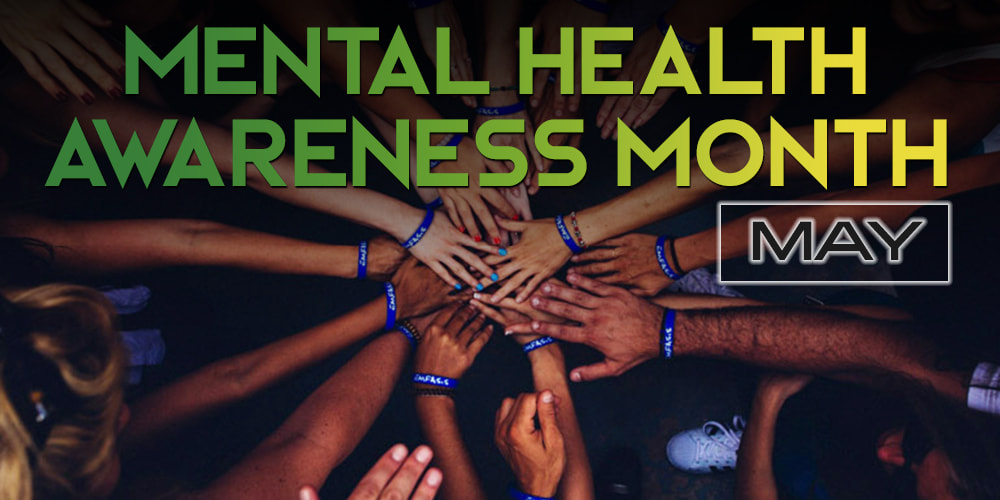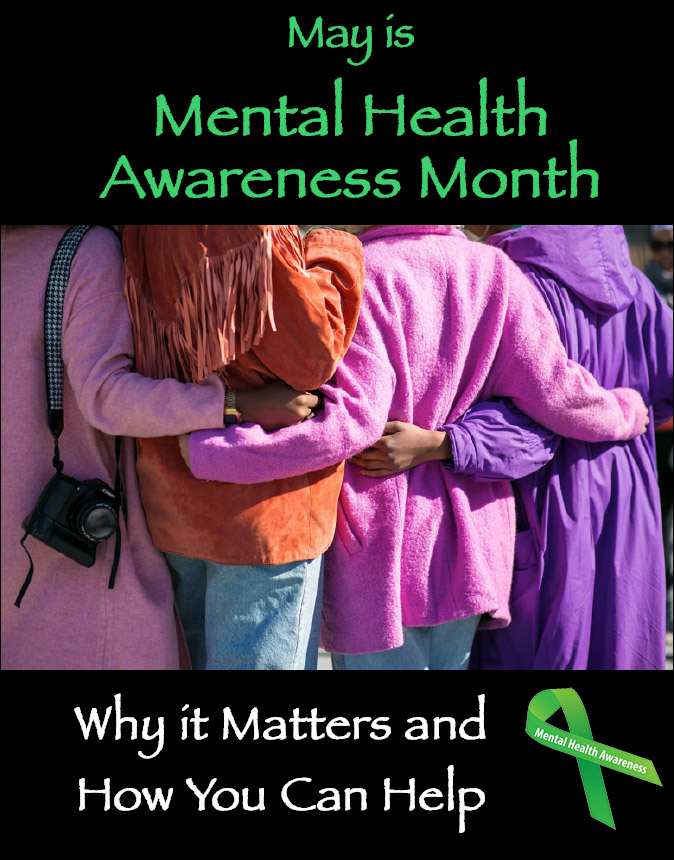
May is Mental Health Awareness Month.
The month is dedicated to educating the public, providing information and resources, and reducing the stigma about mental health.
According to the National Council for Mental Wellbeing, 1 in 5 adults, and 1 in 6 children experience a mental health issue each year, but only half of them receive proper treatment.
Doctors and scientists have been working to unravel the mysteries of the mind for hundreds of years, yet it wasn’t until the 20th century that we came to use the term “mental health” and even longer to designate Mental Health Awareness Month in May.
Over the last 100 years, our regard for many types of mental health disorders has gone from fear to understanding, although we still have a long way to go when it comes to battling the stigma and providing proper treatment.
The 2025 theme of Mental Health Awareness Month is “Turn Awareness into Action.”
History of Mental Health Awareness Month
Mental Health Awareness Month has a fascinating and very long history.
The first sanitariums opened in England during the industrial revolution, and their populations grew exponentially while social support systems were being ripped apart, and brutal working conditions replaced more humane ones.
The phenomenon was quickly replicated in the United States as the destructive aspects of industrialization continued, and the population of those who suffered from mental health problems continued to balloon.
Mental Health Awareness Month was launched in 1949 by an organization called Mental Health America, which was founded in 1909 by Clifford Whittingham. At the time of its founding, it was known as the National Committee for Mental Hygiene.
Whittingham had suffered with mental health problems and was institutionalized several times, experiencing firsthand the barbaric treatment methods used for people with mental health disorders.
These practices included bloodletting, spinning, simulated drowning, forced restraints, beating, starvation, forced sterilization, forced lobotomies, electro-convulsive shock therapy, inducing insulin comas, and so on.
After seeing and experiencing these methods, Whittingham became an active crusader for the reform of psychiatric hospitals and opened the first psychiatric outpatient facility in America.
The organization he founded continues to do an amazing job of carrying on his mission, and Mental Health Awareness Month is one of the many ways they do it.
Unfortunately, the mistreatment of individuals with mental health issues still persists today. The proliferation of homelessness in America is a very stark reminder that we are far from where we need to be.
Creating awareness, education, and developing compassion for the many Americans who suffer from the addiction epidemic and mental health problems is vitally important today.
Despite leaving behind the worst practices of the past, we seem to carry with us an ignorance and sometimes hostility toward people who suffer from mental illness.
Much of the problem is a societal one, with a culture based on rugged individualism, unfettered competition and war, where kids go to bed hungry, and many Americans don’t have any money saved in case of an emergency, even after working two or three jobs.
In today’s world, isolation and joylessness are the norm, children and women aren’t protected, intergenerational trauma is passed down from generation to generation, and minorities often feel the worst brunt of these problems.
Evan Haines, co-founder of Oro House Recovery Centers says, “I personally believe the next frontier of mental health awareness will be to look at the social causes of mental health and addiction problems. As Americans, we need to better understand what mental health is, what is normal, and how as a culture and society we can best address these problems.”
Mental Health Awareness Month is an important way to increase support and understanding for individuals, organizations, and communities across the country.

Why Mental Health Awareness Month Matters
Through programming, community engagement, education, and outreach, Mental Health America works to spread awareness about early identification, intervention, and recovery for those at risk.
Every year during the month of May, millions of people are reached with important messages about mental health thanks to the participation of organizations across the country.
Through media, local events, and screenings, more and more people are beginning to understand the importance of early diagnosis, effective intervention, and proper treatment for mental illness.
The Importance of Dual Diagnosis
When left untreated, mental health disorders and addiction commonly co-occur together.
According to the National Alliance on Mental Illness (NAMI), 57.8 million adults in the United States experienced a mental health issue in 2021, and 19.4 million people also experienced a co-occurring disorder of mental illness and substance use disorder.
These statistics confirm the need for dual diagnosis treatment centers, which simultaneously treat mental health and substance use disorders.
For some people living with a Dual Diagnosis, addiction develops after the onset of a mental health disorder.
For others, addiction may seemingly occur first but is triggered by an underlying and undiagnosed mental health disorder.
It is very common for those struggling with a mental health disorder to use substances to self-medicate. Drugs and alcohol can temporarily alleviate the symptoms of mental health issues by increasing dopamine production and stimulating the pleasure center in the brain.
However, over time, more drugs or alcohol will be required to achieve the same effect, leading to substance use dependence and a decline of mental health.
Through the prolonged use of drugs or alcohol, some people will experience substance-induced disorders leading to mental distress.
It’s common for drug and alcohol abuse to stimulate mental health issues such as:
- Anxiety disorders
- Mood disorders
- Depression
- Paranoia
- Mania
While the cause for this is still widely unknown, research indicates mental health disorders that are triggered by substance use could be the result of genetic predisposition, chemical disruption in the brain, or past trauma.
No matter which disorder occurred first, mental health and substance use disorders must be treated simultaneously. Treating one without the other is insufficient and ineffective.
Ways to Get Involved During Mental Health Awareness Month
By spreading awareness about prevention and early diagnosis, we have the power to help those at risk for serious mental health disorders and substance use disorders.
Everyone can do their part and get involved during Mental Health Awareness Month.
- Learn about depression, anxiety, and other mental health conditions
- Share tips and information about mental illness and support groups
- Ask for help if you or someone you care about is experiencing mental health issues
- Practice self-care and stress reduction techniques
Participate in local events and join the conversation on social media by using the following hashtags:
#MentalHealthMatters
#MentalHealthMonth
#MentalHealthAwareness
#MentalHealthAwarenessMonth
#BreakTheStigma
Share relevant articles or your own story about mental health with others.
By openly discussing the topic of mental health, we can reduce the shame surrounding mental health disorders and combat the stigma many people fear.
For more resources, ways to get involved, events near you, and information about Mental Health Awareness Month, visit the National Alliance on Mental Illness.
Frequently Asked Questions
What are some ways to increase mental health awareness in May?
- Participate in community events like NAMIWalks
- Subscribe to newsletters to stay informed
- Share educational resources and toolkits
- Volunteer at local mental health organizations
- Do a mental health check-in with friends and family
- Support fundraising events
- Promote self-care techniques like exercise, healthy eating, meditation, and mindfulness
- Wear green or use green lights at your home or business to show your support
What are examples of innovative resources available today?
1. AI-Powered Mental Health Apps like Youper and Woebot offer exercies, support, mood tracking, and other strategies to reduce anxiety, stress, and depression.
2. Wearable Technology such as headsets, wristbands, watches, and rings track stress, heart rate, sleep, and other variables associated with mental health.
3. Virtual Reality headsets and apps provide soothing environments to reduce stress and aid in practicing mindfulness.
4. Online Therapy platforms like Talkspace provide access to therapists and resources that are accessed privately from anywhere when in-person sessions aren’t convenient or available.
5. Interactive Apps such as Calm, Headspace, and Happify offer games, meditation, breathing, and other exercises to reduce stress and improve mental health.
What are ways to engage communities in mental health awareness?
1. Encourage people to wear green to spread awareness about mental health.
2. Share toolkits and resources with others in the community.
3. Take advantage of mental health screenings.
4. Host or attend storytelling events where individuals share their stories with others.
5. Organize or take part in community walks and hikes to experience how exercise and nature promote mental wellness.
6. Create and share social media campaigns focused on mental health.
6. Host screenings of documentaries or movies about mental illness and follow them with open discussions.
What are previously successful mental health awareness campaigns?
1. The Calm meditation app aired ‘30 Seconds of Silence’ TV ads during election night in 2024 in the United States to promote a moment of silence, calm, and mindfulness.
2. The Spotify music app launched the ‘Take a Beat’ campaign in 2024 using playlists that encouraged listeners to take a break to reduce stress and be mindful of mental health.
3. Sportswear brand ASICS launched ‘The Desk Break’ campaign in 2024 to motivate people to take a break from sitting to move. Just 15 minutes of movement can have a positive impact on mental health.
4. The ‘Be Vocal: Speak Up for Mental Health’ campaign in 2015 used a documentary film and social media to share stories about mental health from Demi Lovato and others. It ran for several years and helped to reduce the stigma felt by many people.
5. The World Wide Fund for Nature launched the WWF “A Prescription for Nature” campaign in 2024 to promote the positive effect that spending time in nature has on mental health.
Related Posts
- Psilocybin Therapy for Depression Treatment and Mental Health
The push to find new and effective treatment approaches for mental health issues like Psilocybin…
- October is Depression Awareness Month
During Depression Awareness Month in October, we’ll be raising awareness to help people who are…
- June is PTSD Awareness Month
Because trauma impacts so many people, June is recognized every year as PTSD Awareness Month.…
